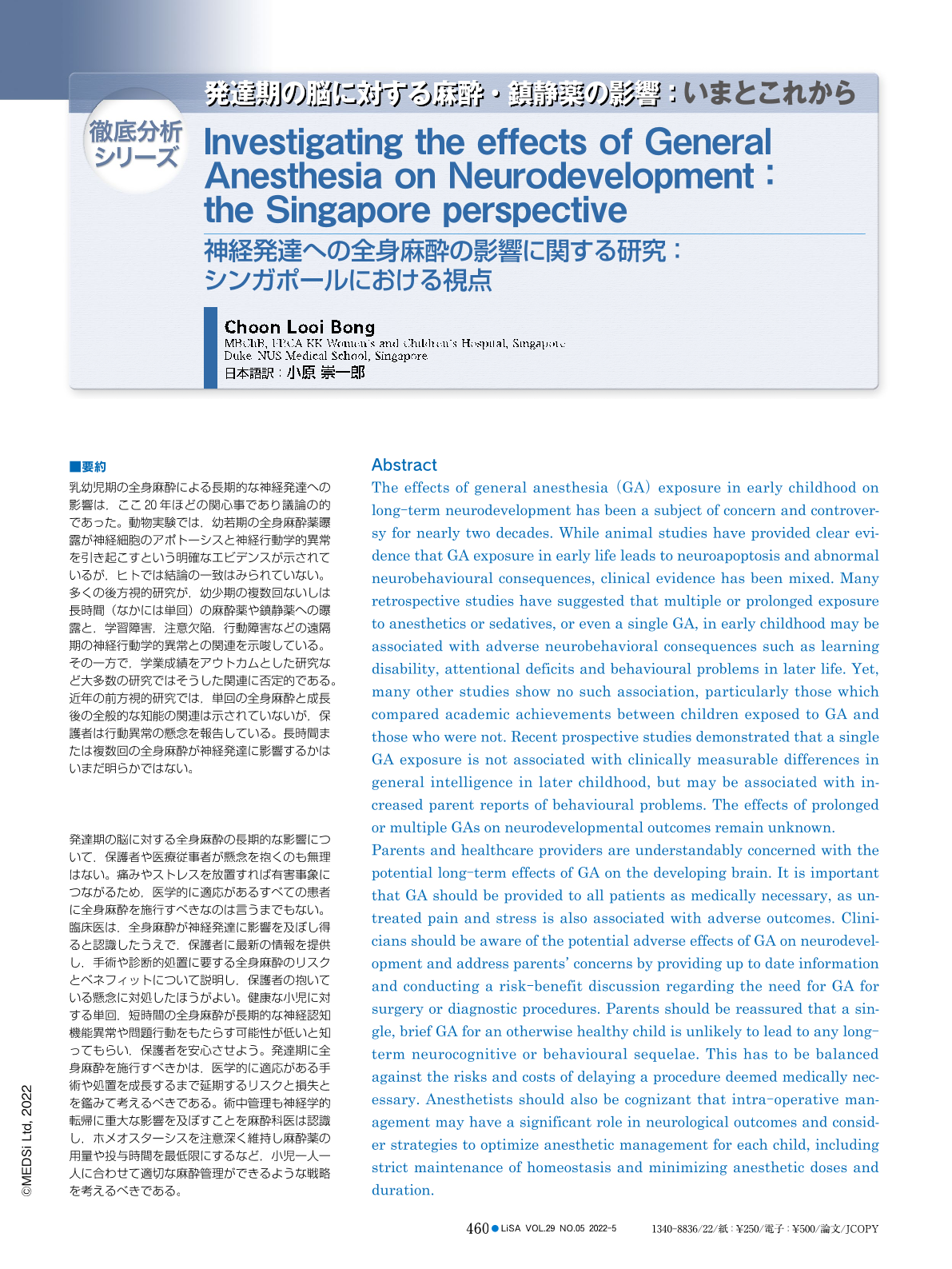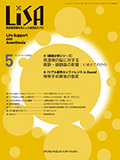- 有料閲覧
- 文献概要
- 1ページ目
- 参考文献
■要約
乳幼児期の全身麻酔による長期的な神経発達への影響は,ここ20年ほどの関心事であり議論の的であった。動物実験では,幼若期の全身麻酔薬曝露が神経細胞のアポトーシスと神経行動学的異常を引き起こすという明確なエビデンスが示されているが,ヒトでは結論の一致はみられていない。多くの後方視的研究が,幼少期の複数回ないしは長時間(なかには単回)の麻酔薬や鎮静薬への曝露と,学習障害,注意欠陥,行動障害などの遠隔期の神経行動学的異常との関連を示唆している。その一方で,学業成績をアウトカムとした研究など大多数の研究ではそうした関連に否定的である。近年の前方視的研究では,単回の全身麻酔と成長後の全般的な知能の関連は示されていないが,保護者は行動異常の懸念を報告している。長時間または複数回の全身麻酔が神経発達に影響するかはいまだ明らかではない。
発達期の脳に対する全身麻酔の長期的な影響について,保護者や医療従事者が懸念を抱くのも無理はない。痛みやストレスを放置すれば有害事象につながるため,医学的に適応があるすべての患者に全身麻酔を施行すべきなのは言うまでもない。臨床医は,全身麻酔が神経発達に影響を及ぼし得ると認識したうえで,保護者に最新の情報を提供し,手術や診断的処置に要する全身麻酔のリスクとベネフィットについて説明し,保護者の抱いている懸念に対処したほうがよい。健康な小児に対する単回,短時間の全身麻酔が長期的な神経認知機能異常や問題行動をもたらす可能性が低いと知ってもらい,保護者を安心させよう。発達期に全身麻酔を施行すべきかは,医学的に適応がある手術や処置を成長するまで延期するリスクと損失とを鑑みて考えるべきである。術中管理も神経学的転帰に重大な影響を及ぼすことを麻酔科医は認識し,ホメオスターシスを注意深く維持し麻酔薬の用量や投与時間を最低限にするなど,小児一人一人に合わせて適切な麻酔管理ができるような戦略を考えるべきである。
Abstract
The effects of general anesthesia (GA) exposure in early childhood on long-term neurodevelopment has been a subject of concern and controversy for nearly two decades. While animal studies have provided clear evidence that GA exposure in early life leads to neuroapoptosis and abnormal neurobehavioural consequences, clinical evidence has been mixed. Many retrospective studies have suggested that multiple or prolonged exposure to anesthetics or sedatives, or even a single GA, in early childhood may be associated with adverse neurobehavioral consequences such as learning disability, attentional deficits and behavioural problems in later life. Yet, many other studies show no such association, particularly those which compared academic achievements between children exposed to GA and those who were not. Recent prospective studies demonstrated that a single GA exposure is not associated with clinically measurable differences in general intelligence in later childhood, but may be associated with increased parent reports of behavioural problems. The effects of prolonged or multiple GAs on neurodevelopmental outcomes remain unknown.
Parents and healthcare providers are understandably concerned with the potential long-term effects of GA on the developing brain. It is important that GA should be provided to all patients as medically necessary, as untreated pain and stress is also associated with adverse outcomes. Clinicians should be aware of the potential adverse effects of GA on neurodevelopment and address parents' concerns by providing up to date information and conducting a risk-benefit discussion regarding the need for GA for surgery or diagnostic procedures. Parents should be reassured that a single, brief GA for an otherwise healthy child is unlikely to lead to any long-term neurocognitive or behavioural sequelae. This has to be balanced against the risks and costs of delaying a procedure deemed medically necessary. Anesthetists should also be cognizant that intra-operative management may have a significant role in neurological outcomes and consider strategies to optimize anesthetic management for each child, including strict maintenance of homeostasis and minimizing anesthetic doses and duration.

Copyright © 2022, MEDICAL SCIENCES INTERNATIONAL, LTD. All rights reserved.


